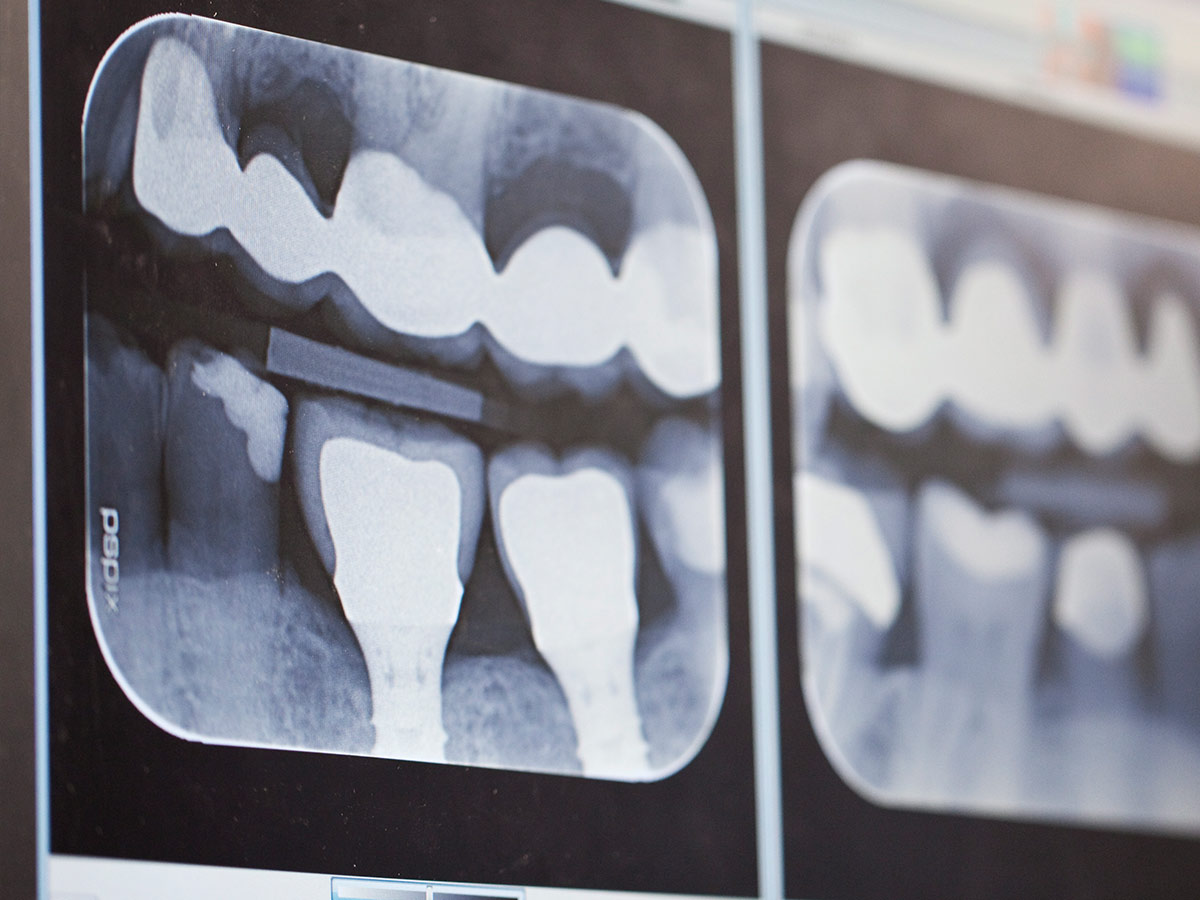
What is Root Canal Therapy?
Teeth are held in the jaws by their roots. Front teeth normally have one root, but teeth further back have more. At the core of each tooth is a soft mass of tissue called the pulp. In a healthy tooth, the pulp contains living fibres, cells, nerves and a blood supply, extending into the root(s) through the root canal(s).
Decay or injury can destroy the living pulp. Because dead pulp lacks a blood supply, it is more prone to infection, leading to an abscess and toothache.
Root canal therapy, or endodontics, is the treatment to remove an infection, and often the damaged nerve, deep inside the root of a tooth. It is a painless modern treatment to save teeth that would otherwise have to be taken out, allowing you to keep your own teeth for a longer.

If you have any further questions please ask a member of the team and we will
be more than happy to answer any of your queries.
Why do I need root canal therapy?
- Bacteria can get into this chamber either from dental decay or directly from the mouth if a filling is lost. Once bacteria are established the blood supply to the nerve diminishes and the tooth begins to die. When this happens the only way to save the tooth is to remove the infection and dying nerve – a procedure called root canal therapy. Unfortunately antibiotics alone can’t kill the bacteria and the only option, other than root canal therapy, is to have the tooth extracted. Sometimes root canal therapy is also used to save a tooth with a large filling or crown or one that has suffered trauma.
What are the benefits?
- Pulp damage can cause toothache but the pain will usually end very quickly when the root canal is cleaned out.
- Without a root filling, a tooth with a dead pulp would probably have to be taken out in the end. There is also a possibility of infection spreading beyond the tooth itself.
- Root-fillings are usually successful and can last many years, but re-treatment is also possible if infection recurs. Occasionally, if inflammation persists at the tip of the root, surgery can be carried out to remove part of the root, clean the area and put in a filling. This is known as an ‘apicectomy’.
Does it hurt?
- Occasionally you may get sensitivity after having root canal therapy completed. In most cases this is usually transient and tends to go away. In teeth that do not settle on their own you may be prescribed antibiotics. In our experience discomfort can last anything between 2 to 8 weeks following completion.
What will my dentist do?
- An x-ray can show the number and shape of the root canals, and also signs of infection in the surrounding bone. Teeth can have a number of roots and some roots are easier to fill than others, because of their shape.
- To keep root canals dry during treatment the dentist may stretch a sheet of thin rubber around the tooth, on a frame outside the mouth; this is called ‘rubber dam’. Having this fitted makes the treatment more comfortable.
- The procedure is PAINLESS. You will be given a local anaesthetic, and then an opening is made through the top of the tooth, down into the pulp. The dentist then uses narrow files to remove the dead pulp from the core of the tooth and from the root canal(s).
- At this point, the dentist may put in a temporary filling and possibly also give you antibiotics if any infection has spread beyond the tooth and you have a raised temperature and feel unwell. If so, you will have to return at a later date, once symptoms have settled, so the dentist can complete the treatment. In the next stage, the dentist fills the root canal(s). A filling is then placed in the remaining cavity in the top of the tooth.
- Root filled teeth can become darker than other teeth, but bleaching can be used to make them look lighter.
- If the root filled tooth has lost a large proportion of its structure your dentist may recommend that the final restoration be a crown or onlay. This will be discussed with you at the time.
What are my alternatives?
- There are not many alternatives if a tooth requires root canal therapy. If it is left untreated infection will spread and cause increasing discomfort and pain. If your dentist feels that the tooth requires specialist care then you will be referred to an Endodontist.The only option available if you do not want to undergo treatment is to have the tooth extracted. You will be left with a gap but this can be restored using a dental implant.
Subscribe to The Dental Surgeons for updates and offers
Stay in the loop with our monthly round-up of special offers, we promise we won’t spam you or share your email address.
WIMPOLE ST. W1
Drop on in
22 Wimpole Street
London, W1G 8GQ
Give us a call
Surgery: +44 20 7580 4580
Emergencies: +44 20 7580 4580